Key takeaways:
- Sustainable fashion emphasizes quality, ethical practices, and environmental impact, represented by trends like circular fashion and secondhand shopping.
- Building a sustainable wardrobe reduces waste, prioritizes durability, and fosters social responsibility, reflecting personal values in fashion choices.
- Ethical denim production involves sourcing materials responsibly, ensuring fair labor conditions, and maintaining transparency in the supply chain.
- Personal journeys to sustainability inspire conscious consumption, emphasizing the significance of supporting eco-friendly brands and local artisans.
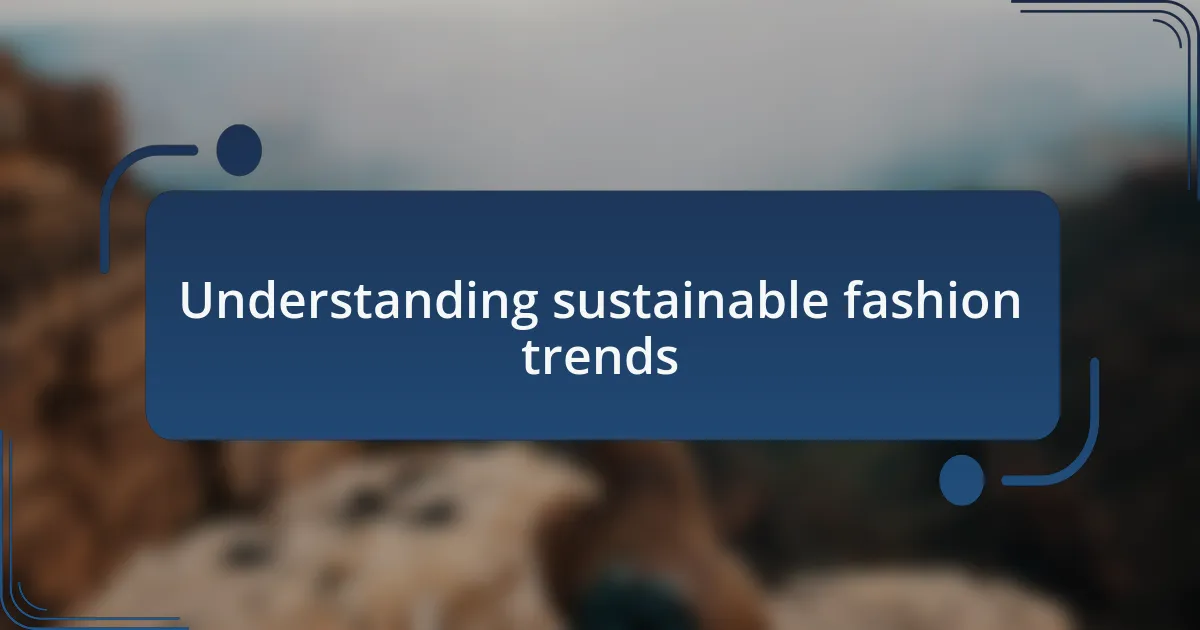
Understanding sustainable fashion trends
Sustainable fashion trends are not just a fleeting movement; they represent a fundamental shift in how we perceive clothing. I remember the first time I stumbled upon an eco-friendly brand while browsing online. It felt like discovering a hidden gem that aligned with my values, and I realized that this was a community passionate about making a difference.
As I explored more, I found that sustainable fashion often emphasizes quality over quantity. For me, this sparked a deeper appreciation for my pieces. I began asking myself questions like, “How is this made?” and “What impact does my purchase have?” Each time I opted for a sustainably made item, it felt like I was casting a vote for the kind of world I want to support.
Trends like circular fashion and secondhand shopping have taken the industry by storm, and it’s exciting to see this transformation. I remember attending a local swap event where I exchanged clothes with friends, breathing new life into garments that would otherwise gather dust. This experience reinforced my belief that fashion can be both stylish and responsible, blending creativity with care for our planet.
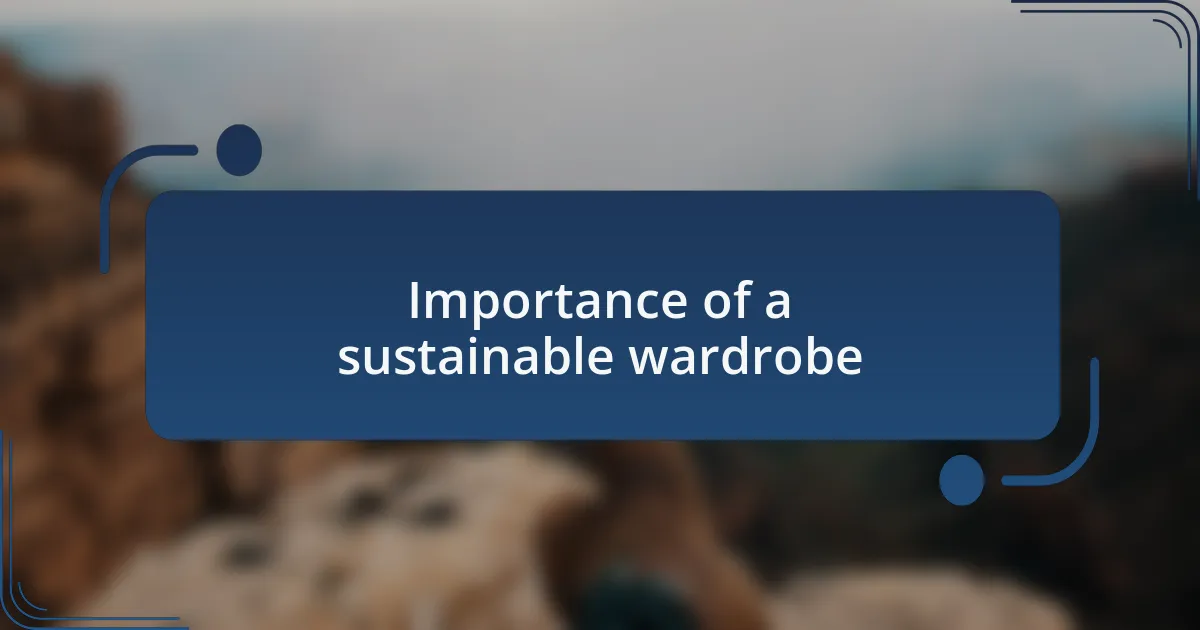
Importance of a sustainable wardrobe
Building a sustainable wardrobe is crucial not only for reducing waste but also for creating a positive environmental impact. When I made the switch to sustainable clothing, I felt a weight lift off my shoulders, knowing that my choices were supporting ethical practices. It’s surprising how our daily decisions can ripple out into larger changes. Have you ever thought about how much water is used in traditional cotton farming? Knowing that, I felt compelled to seek alternatives that conserved natural resources.
Moreover, investing in a sustainable wardrobe means prioritizing durability and timeless design. I vividly recall my excitement while discovering a pair of jeans made from organic cotton that fit perfectly. Unlike fast-fashion pieces that quickly wear out, I appreciated the craftsmanship and the story behind them. It not only encouraged me to consider longevity in fashion, but it also fostered a deeper connection to my clothes—each piece now felt like a unique part of my personal journey.
Lastly, sustainable fashion advocates for social responsibility, often prioritizing fair labor practices. I remember attending a panel discussion where a labor rights advocate spoke passionately about the importance of ethical sourcing. It struck me that my wardrobe could reflect not just my personal style, but also my values. Supporting brands that uphold these principles made me feel empowered, as if each purchase was my way of contributing to a fairer world. Isn’t it empowering to know that your choices can help shape industries for the better?
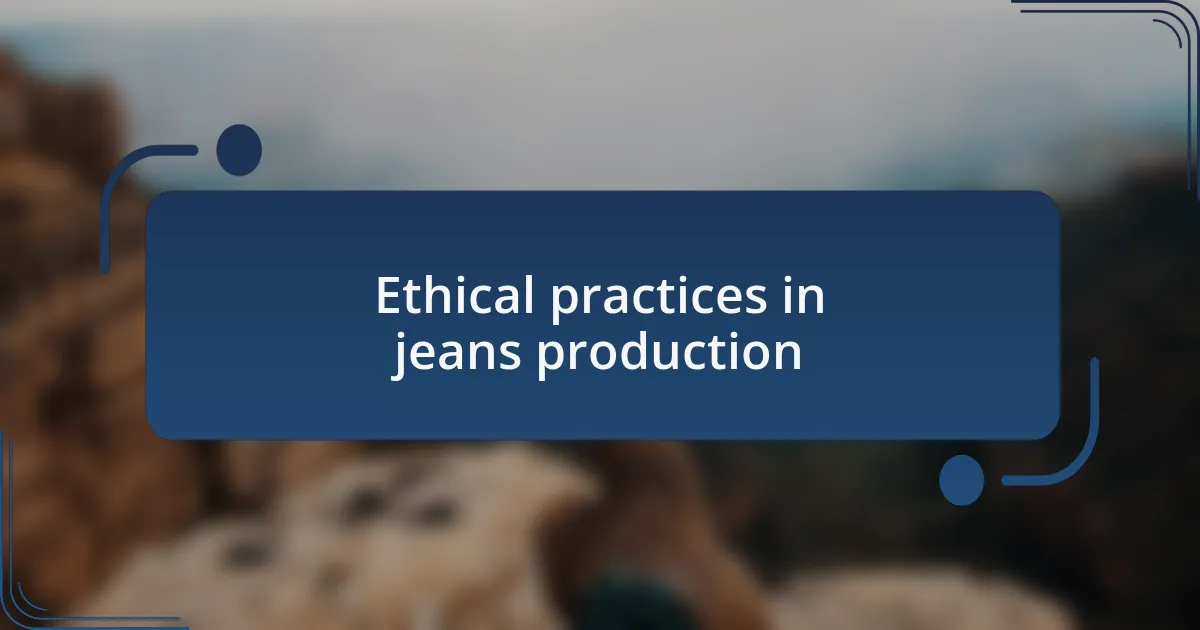
Ethical practices in jeans production
Ethical practices in jeans production often start with sourcing materials that significantly reduce environmental impact. For example, I recently discovered a brand that uses recycled water in their dyeing process, which not only conserves this precious resource but also minimizes harmful runoff. Have you ever thought about how that choice affects not just the planet but the communities surrounding production facilities?
Moreover, labor conditions play a crucial role in what defines ethical production. I was taken aback while reading about a denim brand that provides workers with fair wages and safe working conditions. This commitment to social responsibility adds a layer of meaning to each pair of jeans—knowing that my choice supports better livelihoods truly enhances my shopping experience. Isn’t it fulfilling to wear jeans that align with values of fairness and respect?
Lastly, transparency in the supply chain is essential for ethical production. When one brand shared detailed information about each step in their manufacturing process, I felt a newfound respect for their dedication to accountability. It made me reflect on the importance of consumer awareness—how can we truly make informed choices if we don’t know what goes into our clothes? This transparency not only builds trust but also encourages us to demand more from the brands we support.
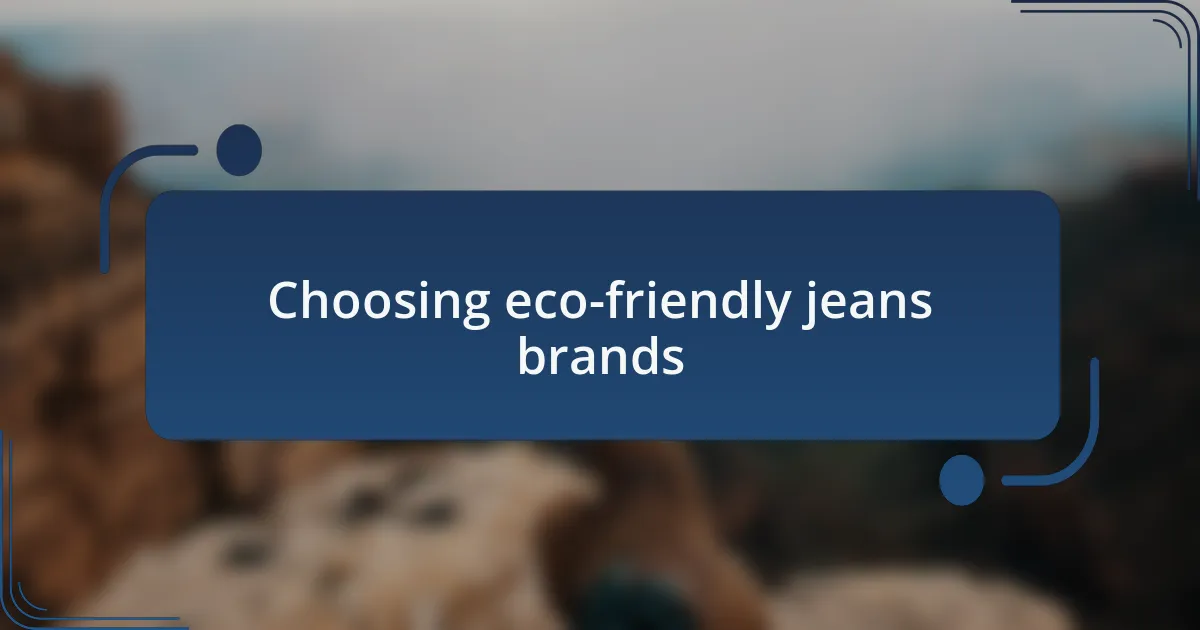
Choosing eco-friendly jeans brands
Choosing eco-friendly jeans brands can be an eye-opening experience. I remember my first visit to a sustainable fashion store—I was amazed by the variety of options that didn’t compromise style for ethics. It made me wonder, how often do we overlook the brand’s environmental impact in favor of trends? I now prioritize denim brands that are transparent about their materials and production processes.
When selecting jeans, consider those made from organic cotton or recycled materials. I personally gravitate towards brands that reflect my values—like one I found that uses innovative methods to reduce water usage in their production. That sense of responsibility behind my choice gives me more than just a great fit; it offers me peace of mind. Doesn’t it feel good when your style choices resonate with your values?
I’ve come to appreciate brands that not only produce high-quality jeans but also focus on longevity. Opting for timeless designs allows me to build a wardrobe that defies fast fashion. It’s thrilling to know that every piece I choose contributes to a more sustainable future. Isn’t it better to wear jeans that not only look great but also have a positive impact on our planet?
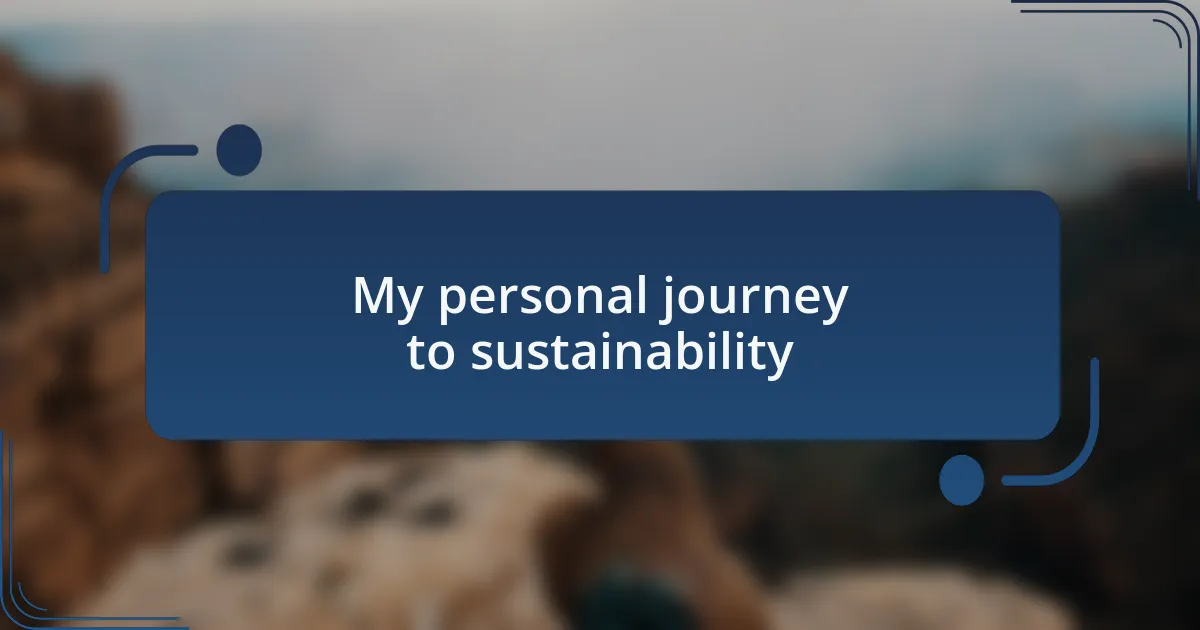
My personal journey to sustainability
My journey to sustainability began long before I understood what it truly meant. I remember sifting through my closet one day and feeling a wave of guilt wash over me as I realized how many garments I had purchased on a whim. That moment was a catalyst; I started asking myself, what if each piece I owned told a story of ethical responsibility instead of careless consumption?
As I delved deeper into the world of sustainable fashion, I found myself revisiting my childhood memories of my grandmother mending her clothes instead of throwing them away. Those moments spoke to me—why not embrace a mindset of repair rather than replace? This emotional connection to sustainability reinforced my choice to invest in quality pieces that can withstand the test of time, merging nostalgia with mindful living.
Transitioning to a sustainable wardrobe has certainly reshaped my shopping habits. I often find myself browsing boutique stores that showcase local artisans, feeling excited to discover unique jeans that not only look stylish but also support my community. It’s more than just clothing; it’s about making conscious choices that challenge the superficiality of fast fashion. How rewarding it is to know that my wardrobe choices can pave the way for a greener future!
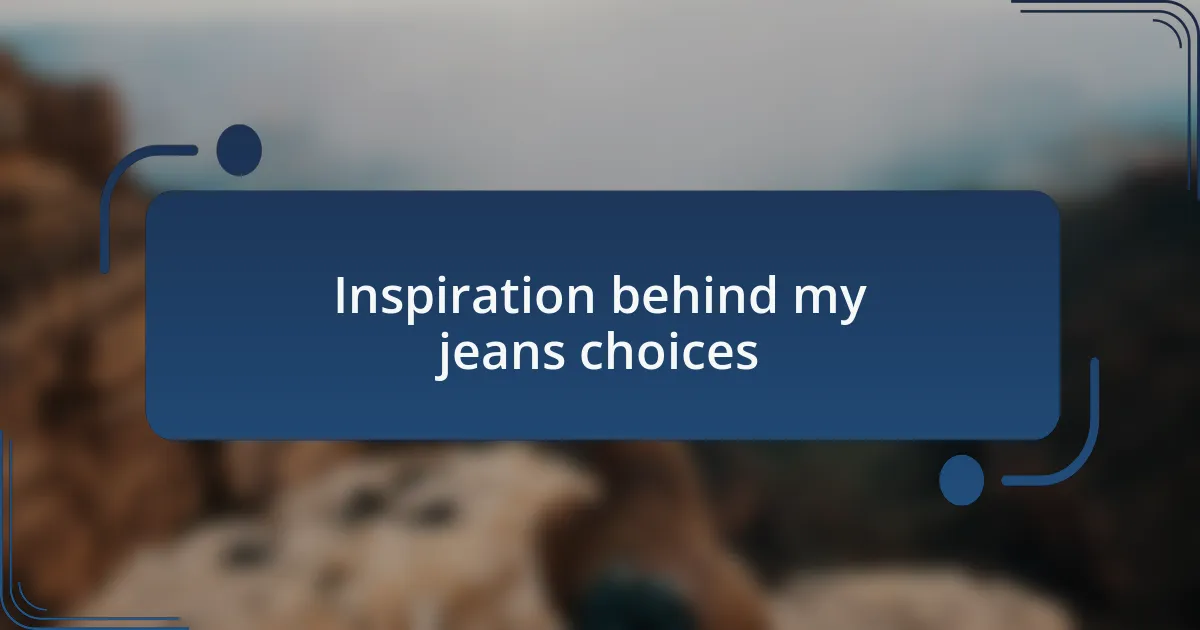
Inspiration behind my jeans choices
When I began to reconsider my denim choices, it felt like peeling back layers of a deeply ingrained habit. One afternoon, I tried on a pair of sustainably-produced jeans that not only fit beautifully but also made me feel good about my purchase. The thought struck me: these jeans were not just garments; they were symbols of a shift toward respecting our planet.
I remember attending a sustainability workshop where the speaker passionately discussed the impact of the fashion industry on the environment. It hit me hard as I realized that traditional denim production often involves harmful practices, from excessive water usage to toxic dyes. With that knowledge, I felt a compelling urge to select brands that prioritize eco-friendly materials. Suddenly, my jeans became more than a fashion statement; they turned into a personal commitment to a better world.
Every time I pull on my favorite high-waisted jeans, I’m reminded of the story behind them—crafted from organic cotton and dyed with plant-based dyes. It’s a small choice, but it stirs a sense of pride in me. I often wonder, how many people take the time to understand the journey of their clothes? For me, those decisions reflect a deeper connection to the broader movement of sustainability, one pair of jeans at a time.